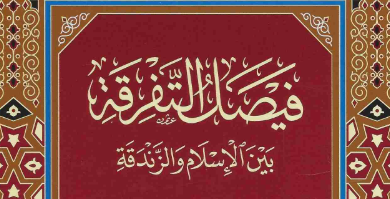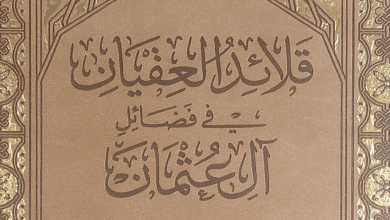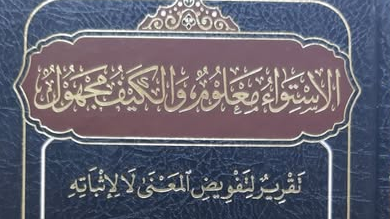Answers to doubts over the ‘Aqidah of Imam Abu Hanifah
An Explanation of the Irja’ of Imam Abu Hanifah
This issue of irja’ (literally: postponement) with respect to Imam Abu Hanifah – which has unforunately become a common talking point for the denigrators of the Imam – was discussed in great detail by Imam ‘Abd al-Hayy al-Laknawi in his al-Raf’ wa l-Takmil (pp. 149-81). When the term “irja” was applied to Imam Abu Hanifah, his shuyukh and his students, it was from two groups:
1. The first are the Mu’tazilah and the Khawarij who used this term for them because they actively opposed the Mu’tazilah and the Khawarij in their belief that a major sin takes one out of faith (iman). Imam al-Shahrastani (d. 548) wrote in his work al-Milal wa l-Nihal, “[Abu Hanifah] would oppose the Qadariyyah and the Mu‘tazilah who appeared in the early period, and the Mu‘tazilah would designate all who opposed them with regards to faith “murji’”.” (quoted in al-Raf’ p. 155) The Mu’tazili and Khariji belief is that a believing perpetrator of a major sin who does not repent will forever be punished in the Fire, and this belief is opposed by the Ahl al-Sunnah.
Imam al-Shahrastani also said: “The men of the murji’ah [i.e. the famous personalities who believed in irja’], as transmitted, are: al-Hasan ibn Muhammad ibn ‘Ali ibn Abi Talib, Sa‘id ibn Jubayr, Talq ibn Habib, ‘Amr ibn Murrah, Muharib ibn Dithar, Muqatil ibn Sulayman, Dharr, ‘Amr ibn Dharr, Hammad ibn Abi Sulayman, Abu Hanifah, Abu Yusuf, Muhammad ibn al-Hasan and Qudayd ibn Ja‘far. These are all imams of hadith. They did not declare the perpetrators of major sins disbelievers due to a major sin, and they did not make a judgement that they abide eternally in the Fire, as distinguished from the Khawarij and the Qadariyyah.” (quoted in al-Raf’ p. 164)
Similarly al-Taftazani said in Sharh al-Maqasid: “It is well-known regarding the madhhab of the Mu‘tazilah that the perpetrator of a major sin without repentance will be made to stay eternally in the Fire, even if he lived for a hundred years upon faith and obedience. They do not distinguish between the major sin being one or many, and [whether] it occurred before the acts of obedience, after them or between them. They deem [the position of] uncertainty about punishment, and consigning the matter to Allah, forgiving if He wishes and punishing if He wishes, which is the madhhab of the people of truth, irja’, in the sense that it is postponement of the matter and uncertainty of punishment and reward. By this consideration, Abu Hanifah and others were placed amongst the murji’ah.” (quoted in al-Raf’ p. 158)
2. The second group who referred to Abu Hanifah and other fuqaha as “murji’” are the muhaddithun, like Imam al-Bukhari, who believed that works/deeds (‘amal) are included in the definition of iman and iman increases and decreases, so they referred to those who said works are not included in the definition of iman and that it does not increase and decrease in its essence “murji’ah.” Al-Laknawi offers a number of quotes from the books of Rijal to prove this, including the following: Al-’Asqalani narrated in Lisan al-Mizan in the biography of Muhammad ibn al-Hasan:
Ibn ‘Adi transmitted from Ishaq ibn Rahwayh: I heard Yahya ibn Adam say: Sharik would not permit the testimony of the murji’ah. Muhammad ibn al-Hasan bore testimony before him and he rejected his testimony. He was asked about this, and he said: “I do not permit the testimony of one who says prayers are not from faith!” (quoted in al-Raf’ pp. 162-3) This is clear in showing that the muhaddithun regarded those who believed works are not included in the definition of iman as murji’ah.
It is clear, therefore, that the reason Imam Abu Hanifah, his students and his teachers, were called“murji’ah” by the Mu’tazilah firstly and the muhaddithun later, is their belief in the following:
1. Works are not included in the definition of the essence of faith (iman)
2. Faith (iman) does not increase or decrease
3. The believing man who perpetrates a major sin and does not repent may be punished and he may be forgiven
The latter is the belief of all of the Ahl al-Sunnah. The first two is the belief of the ‘aqidah-scholars including Imam al-Tahawi (in his al-Aqidat al-Tahawiyyah), al-Maturidi, Abu Hanifah, and others, with the hadith-scholars disagreeing. However, this is only a semantic dispute as concluded by the verifying scholars, because although the muhaddithun include works in the definition of iman, if a man has no works and he is sinful, they still accept that he may be a believer (mu’min) which implies that the absence of works does not necessarily imply even according to them the absence of faith (iman). Therefore, works, in this sense, even according to the muhaddithin, are not included in iman, whereas confirmation with the heart (tasdiq bi l-qalb) is universally accepted as being fundamental to the nature and essence of iman.
Regarding the second point, it is as articulated by al-Tahawi, “Iman is confession with the tongue and confirmation with the heart, and that everything that was revealed by Allah in the Qur’an and everything that is authentic from the Prophet (Allah bless him and grant him peace) regarding the Shari’a and explanation [of the Qur’an] is all true. Iman is one and its adherents are in its essence the same, and the superiority [of some over others] is due to taqwa and opposing desires.” (al-’Aqidat al-Tahawiyyah)
Again, the dispute with the muhaddithun on this issue is a semantic dispute as all agree the believers vary, but Abu Hanifah, al-Tahawi and others say this variation is not in the essence of iman but in its branches, while others say this variation is in iman itself.
There is no doubt, therefore, that the murji’ah are two types: those of the Ahl al-Sunnah and those deviants who claimed that sins do not harm a believer and faith is sufficient for salvation, both of which Abu Hanifah rejected. This division of the murji’ah was explicitly mentioned by some of the scholars, including al-Shahrastani, Abu Shakur al-Salimi (d. 1077), and al-Birgivi (d. 981). It was even reported from Imam Abu Hanifah in his letter to ‘Uthman al-Batti.
Regarding a commonly quoted passage from Ghunyat al-Talibin by Imam ‘Abd al-Qadir al-Jilani in which he includes the “Hanafiyya,” subscribers to the doctrine of irja’ amongst the deviant groups, al-Laknawi discusses this at great length on pages 166-81. He shows that at best this is a contradiction from al-Jilani (who is not infallible), since he refers to Imam Abu Hanifah as “Imam” and quotes his opinions as valid fiqhi opinions. Examples of this are given in page 169 of al-Raf’ wa l-Takmil. This shows al-Jilani did not believe Abu Hanifah was a deviant.
Then, al-Laknawi offers a number of responses to this text from Ghunyat al-Talibin, and he favours the following: Al-Shahrastani, while listing the murji’ah, included the sect called “Ghassaniyyah” which he describes as “the Ghassaniyyah, the companions of Ghassan ibn Aban al-Kufi who believed that faith is knowledge of Allah and His Messenger and acceptance of all that the Messenger brought, and that if a speaker were to say “I know that Allah made Hajj to the Ka‘bah obligatory but I do not know where the Ka‘bah is, and it may be in India, he is a believer.”” (quoted in al-Raf’ p. 153)
In Ghunyat al-Talibin, al-Jilani uses almost the exact same description of the beliefs of “Hanafiyya” when describing their irja: “As for the Hanafiyyah, they are the companions of Abu Hanifah al-Nu‘man ibn Thabit. They believe that faith is knowledge and acceptance of Allah and His Messenger and all that he brought from His presence.” (quoted in al-Raf’ p. 167)
Al-Jilani, while listing the groups of murji’ah, did not mention the Ghassaniyyah and it is known Ghassan would falsely attribute his madhhab to Abu Hanifah: Al-Shahrastani said, “It is strange that Ghassan would narrate his madhhab from Abu Hanifah and he counted him amongst the murji’ah. This is most probably a slander against him.” (quoted in al-Raf’ p. 155)
Ibn Hajar al-Makki said something similar. Al-Jilani, therefore, by “Hanafiyyah” and the “companions of Abu Hanifah” most probably meant the Ghassaniyyah who claimed to follow Abu Hanifah. It is also well-known that many of those who followed Abu Hanifah in the peripheral matters of jurisprudence were Mu’tazili in creed or followed another deviant creed. Al-Jilani’s statement is therefore best understood not as referring to Abu Hanifah and his true companions/followers, but this deviant sect called the Ghassaniyyah who claimed to be followers of Abu Hanifah.
—————————————–
Abu Hanifah lived at a time when many new deviations were emerging, like Rafidism, Jahmism and Muqatilism, and he stood fast on the beliefs of the Ahl al-Sunnah, and condemned them in strong terms. For example, Al-Khatib al-Baghdadi narrates: al-Khallal reported to us: al-Hariri reported to us that ‘Ali ibn Muhammad al-Nakha‘i narrated to them: Muhammad ibn al-Hasan ibn Mukram narrated to us: Bishr ibn al-Walid narrated to us: I heard Abu Yusuf say: Abu Hanifah said: “Two groups of the worst of people are from Khurasan: the Jahmiyyah and the Mushabbihah(antropomorphists),” and he probably said [instead of “Mushabbihah”] “Muqatiliyyah (followers of Muqatil ibn Sulayman (d. 150 H)).” (Tarikh Baghdad 15:514-15) Dr. Bashshar ‘Awwad Ma‘ruf said: “Its isnad is sahih, its narrators are trustworthy (thiqat).”
With the same chain, al-Khatib narrates: al-Nakha‘i said: Muhammad ibn ‘Ali ibn ‘Affan narrated to us: Yahya ibn ‘Abd al-Hamid ibn ‘Abd al-Rahman al-Himmani narrated to us from his father: I heard Abu Hanifah say: “Jahm ibn Safwan is a kafir.” (Tarikh Baghdad 15:515) Dr. Bashshar ‘Awwad Ma‘ruf said: “Its isnad is hasan.”
Imam Abu Hanifah’s opinion on Jahm is in fact quoted in the books of Rijal. Al-’Asqalani said inTahdhib al-Tahdhib (vol 10:281): “Muhammad ibn Sima’ah (who is thiqah according al-Saymari and saduq according to al-’Asqalani in al-Taqrib) narrated from Abu Yusuf from Abu Hanifah that he said: ‘Jahm went overboard in negation until he said: He [i.e. Allah] is nothing, and Muqatil went overboard in affirmation until He deemed Allah to be like His creation.’” Al-’Asqalani also quotes him saying: “Two disgusting opinions came to us from the east: Jahm the negator [of Allah’s attributes] and Muqatil the anthropomorphist.”
This clearly illustrates Imam Abu Hanifah’s greatness in the eyes of the scholars of Rijal, and the fact Imam Abu Hanifah stood against the distortions in ‘aqidah, of ta’til (negating Allah’s attributes) and tashbih (comparing Allah to creation) in this early period. Some of his expressions in ‘aqidah were recorded by his students, and the most famous statement on the creed of Abu Hanifah is Imam al-Tahawi’s Bayanu ‘Aqidati Ahl al-Sunnah wa al-Jama’ah which is probably the most well-known and accepted formulae on Muslim creed throughout the history of Sunni Islam.
Imam Abu Hanifah on the Uncreatedness of the Qur’an
Because some of the students of the companions of Imam Abu Hanifah supported and propogated the Mu’tazili doctrine of the createdness of the Qur’an, and campaigned for it during the infamous mihnah which began under the reign of caliph Abu al-’Abbas al-Ma’mun (170 – 218), some began to suspect that this was the opinion of Imam Abu Hanifah himself. In fact, in Orientalist circles, this view is still current, that Abu Hanifah originated the doctrine of the createdness of the Qur’an! But, Imam Abu Hanifah, is innocent of this heresy. In examining a few narrations from al-Khatib al-Baghdadi’s biography of the Imam, I will show that the preponderant view amongst the companions of Abu Hanifah was that of the uncreatedness of the Qur’an, and this is in fact traced authentically to the Imam himself, while a few followers of his school strayed and adopted the Mu’tazili and Jahmi doctrine.
1. Al-Khatib al-Baghdadi narrated with his chain to al-Hakam ibn Bashir that he said: “I heard Sufyan ibn Sa‘id al-Thawri and al-Nu‘man ibn Thabit say: ‘The Qur’an is the uncreated speech of Allah.’” (al-Qur’an kalam Allah ghayr makhluq) (Tarikh Baghdad 15:517) Dr. Bashshar ‘Awwad Ma‘ruf comments: “Its isnad is hasan.”
This is, therefore, an authentic report establishing that Imam Abu Hanifah believed in the uncreatedness of the Qur’an in accordance with the position of the Ahl al-Sunnah wa al-Jama’ah. This is further corroborated by Imam al-Tahawi’s transmission of the beliefs of Imam Abu Hanifah in his famous creedal formula known as al-’Aqidat al-Tahawiyyah, and by al-Fiqh al-Akbar which is either the work of Imam Abu Hanifah himself or at least accurately represents his views based on an early account from him – both of which state that the Qur’an is the uncreated speech of Allah.
2. Al-Khatib al-Baghdadi narrated with a chain of trustworthy narrators, besides one narrator who is unknown, that Ibn al-Mubarak came to Abu Hanifah and Abu Hanifah said to him: “What is this thing that has crept amongst you [i.e. the people of Khurasan]?” He said to him: “A man called Jahm.” He said: “What does he say?” He said: “He says the Qur’an is created.” Thereupon, Abu Hanifah said [quoting the Qur’an]: “Grave is the word that comes out of their mouths! (Qur’an 18:5).” (Tarikh Baghdad 15:517)
Although there is some question over the authenticity of this report due to the unidentifiable narrator in the chain, it is known that Abu Hanifah opposed Jahm on the issue of the attributes of Allah and he also declared him a disbeliever as shown above, so it is probable he addressed this false belief of Jahm also.
3. Al-Khatib narrated with his chain to Abu Bakr al-Marrudhi that he said: “I heard Abu ‘Abd Allah Ahmad ibn Hanbal say: ‘It is not authentic according to us that Abu Hanifah would say the Qur’an is created.’” (Tarikh Baghdad 15:517) Dr. Bashshar ‘Awwad Ma‘ruf comments: “Its isnad is sahih.”
Imam Ahmad ibn Hanbal was the champion of the Ahl al-Sunnah during the period of the mihnah, and his major enemies besides the ruling elite were some scholars of the Hanafi school, in particular the judge Ahmad ibn Abi Dawud; and even as the charge that Abu Hanifah supported the state doctrine was being propogated, Imam Ahmad did not buy into this false propaganda and defended the Imam.
4. Al-Khatib al-Baghdadi narrated with his chain to al-Nakha‘i that he said: Muhammad ibn Shadhan al-Jawhari narrated to us: He said: I heard Sulayman al-Juzjani and Mu‘alla ibn Mansur al-Razi say: “Abu Hanifah did not speak about [the createdness of] the Qur’an, nor Abu Yusuf, nor Zufar, nor Muhammad, nor any of their companions. Only Bishr al-Marisi and Ibn Abi Dawud spoke about [the createdness of] the Qur’an, so they tarnished [the good beliefs of] the companions of Abu Hanifah.” (Tarikh Baghdad 15:518). Dr Bashshar says: “Its isnad is sahih.”
The scholars who are quoted in this report, Abu Sulayman al-Juzjani and Mu‘alla ibn Mansur, were major scholars of Hanafi jurisprudence, as known to muftis of the Hanafi school. They were authors of some Nawadir literature, and fatawa. They were also amongst the few scholars who openly opposed the view of the createdness of the Qur’an, although this was before al-Ma’mun’s inquisition.
Mu‘alla ibn Mansur al-Razi, Abu Ya‘la (150 – 211), is a narrator of hadith found in all the six famous collections of hadith. He narrated from the famous hadith-scholar Hammad ibn Zayd (98-179) as found in Sahih al-Bukhari, and he also narrated from ‘Abd Allah ibn al-Mubarak, Malik ibn Anas, al-Layth ibn Sa‘d, and from the students of Imam Abu Hanifah, Yahya ibn Zakariyya ibn Abi Za’idah, Qadi Abu Yusuf, ‘Ali ibn Mushir and Muhammad ibn al-Hasan al-Shaybani. Abu Zur‘ah al-Razi said: “Al-Mu‘alla was the best of the group – meaning, the champions of juristic opinion (ashab al-ra’y) – according to the people of knowledge. That was because he was ardent in his search for knowledge and he travelled and gave attention [to it]…al-Mu‘alla is reliable.” Yahya ibn Ma‘in said he is trustworthy. Yahya ibn Ma‘in narrated: “Al-Mu‘alla ibn Mansur al-Razi was one day praying, when his head was stung by a wasp, and he did not move until he completed his salah. When they looked, his head had become extremely swollen.” Al-‘Ijli said: “Trustworthy, a champion of sunnah. He was noble. They asked him to take the position of judge and he refused multiple times.” Ya‘qub ibn Shaybah said: “Trustworthy…proficeint, reliable, a jurist.” Ibn Sa‘d said: “He resided in Baghdad, sought hadith, and he was reliable, a master of hadith, opinion and jurisprudence.” Abu Hatim al-Razi said: “He was reliable in hadith and a champion of juristic opinion.” Ahmad ibn Kamil al-Qadi said: “Mu‘alla ibn Mansur was from the senior companions of Abu Yusuf and Muhammad, and from their trustworthy ones in transmission and narration.” Abu Ahmad ibn ‘Adi said: “I hope there is no harm in him because I did not find any objectionable hadith from him.” It was narrated from him that he said: “Whoever says the Qur’an is created is according to me a disbeliever.” Al-Khatib said: “He was a jurist from the champions of opinion. He took from Qadi Abu Yusuf and he was trustworthy.” (Tahdhib al-Kamal 28:291-7) Ibn Hajar al-’Asqalani wrote in al-Taqrib, “Mu’alla ibn Mansur al-Razi, Abu Ya’la, a resident of Baghdad, a trustworthy Sunni jurist, he was asked to become judge and he refused, those who claimed Ahmad accused him of lying erred.”
Regarding Abu Sulayman al-Juzjani, al-Dhahabi says: “‘Allamah Imam Abu Sulayman Musa ibn Sulayman al-Juzjani al-Hanafi, the companion of Abu Yusuf and Muhammad. He narrated from them and from Ibn al-Mubarak. Qadi Ahmad ibn Muhammad al-Birti, Bishr ibn Musa, Abu Hatim al-Razi and others narrated from him. He was reliable (saduq) and dear to the scholars of hadith. Ibn Abi Hatim said: “He would anathematise those who held the Qur’an was created.” (al-Jarh wa al-Ta‘dil 8:145) It was said that al-Ma’mun offered him the position of judge and he refused, and he gave the excuse that he is not qualified for it so he excused him. He became noble in the eyes of the people due to his refusal. He authored books.” (Siyar A’lam al-Nubala 10:194 )
Al-Khatib described him as: “Musa ibn Sulayman, Abu Sulayman al-Juzjani. He heard ‘Abd Allah ibn al-Mubarak, ‘Amr ibn Jumay‘ and Abu Yusuf and Muhammad ibn al-Hasan, the two companions of Abu Hanifah. He was a faqih with insight into juristic opinion. He adopted the methodology of the Sunnah regarding the Qur’an [i.e. that it is uncreated]. He lived in Baghdad and narrated therein. ‘Abd Allah ibn al-Hasan al-Hashimi, Ahmad ibn Muhammad ibn ‘Isa al-Birti and Bishr ibn Musa al-Asadi narrated from him. Ibn Abi Hatim said: ‘My father wrote from him and he said he was reliable.’” (Tarikh Baghdad 15:26-7)
Abu Sulayman al-Juzjani and Mu’alla ibn Mansur were of course more aware of the views of their teachers and their grand-teacher than others.
Therefore, although Bishr ibn Ghiyath al-Marisi (140 – 218) and Ahmad ibn Abi Dawud (full name: Ahmad ibn Faraj ibn Hariz) (160 – 240) stood as proponents of the Mu’tazili doctrine while claiming to belong to the Hanafi school, true followers of the madhhab opposed them, and clarified the position of their teachers and the teacher of their teachers. “Bishr” in Arabic means “joy” and “Ahmad” means “the most praised.” Based on this, Imam al-Dhahabi wrote under the biography of Bishr al-Marisi: “He was the bishr (joy) of evil while Bishr [ibn al-Harith] al-Hafi [the famous ascetic] (152 – 227) was the bishr of goodness, just as Ahmad ibn Hanbal was the ahmad (the most praised one) in the Sunnah and Ahmad ibn Abi Dawud was the ahmad in bid’ah.” (Siyar A’lam al-Nubala 10:202)







JazakAllahu Khaira
Assalamu alykum, excellent information Alhamdulillah, I have a question the scholar abdurahman ibn mihammad ibn idris razi ibn abi hatim who wrote the tafsir al Qur’an, is he Ash’ari in creed? Pls let me know, Im currently interested only in Ash’ari Maturidi scholars. Because i was thinking to get his tafsir.. Let me know jazakallahu khyran.
Wa alaikum salam
It is not known to us if he was an Ash’ari in creed as he usually leaves out his own views and quotes those prior to his age with chains of transmission. There are things in the work that are inline with Ash’ari and Maturidi aqa’id.
Assalamu alykum, Jazakallahu khyran, I can’t still get over with them ‘Stealing’ Works of our Scholars honestly, Tafsir Ibn Kathir and they drag in there Baatil Aqeedah. The worst Fath ul bari which is being sold for only £67 an edition inc bin baz!! Who refutes Ibn hajar!! Imam nawawi rh works and many others! We can’t let this go on!! This Shows how ignorant they and there scholars are who don’t have a line of scholars back to the salaf!! No doubt!! to teach this deen. They are thugs!! Thieves!! Steal and take what there desires feel and leave what there desires disagree. And Evidences are against them not for them.
I appreciate alot when sites like these are defending the truth Alhamdulillah. I have seen online forums debates even after video lectures these salafis loose everytime no wonder they scared to debate!! One thing is for sure with certainty if the debates come live bringing there shayookh with ours which they are scared to do. Salafiyyah will be buried in the ground completety.
I have to think twice when i buy books just to be sure its not fiddled and distorted by these juhaal salafis. I apologise but its just my rage at them is only because they lie and lie and distort in Islam.
Assalaamo alaikom,hopefully you are well.
Can you please give me answers and proofs on the creed of Imaam shafie’r.a